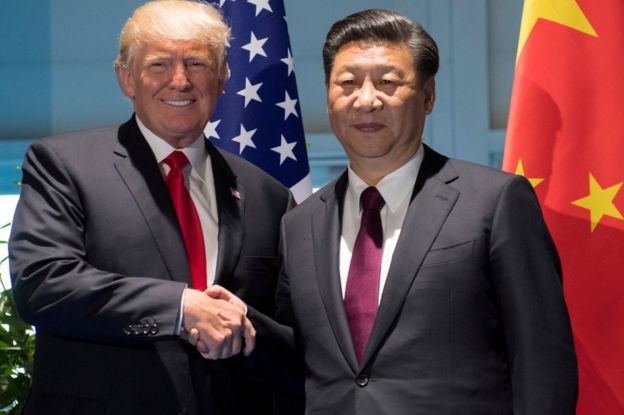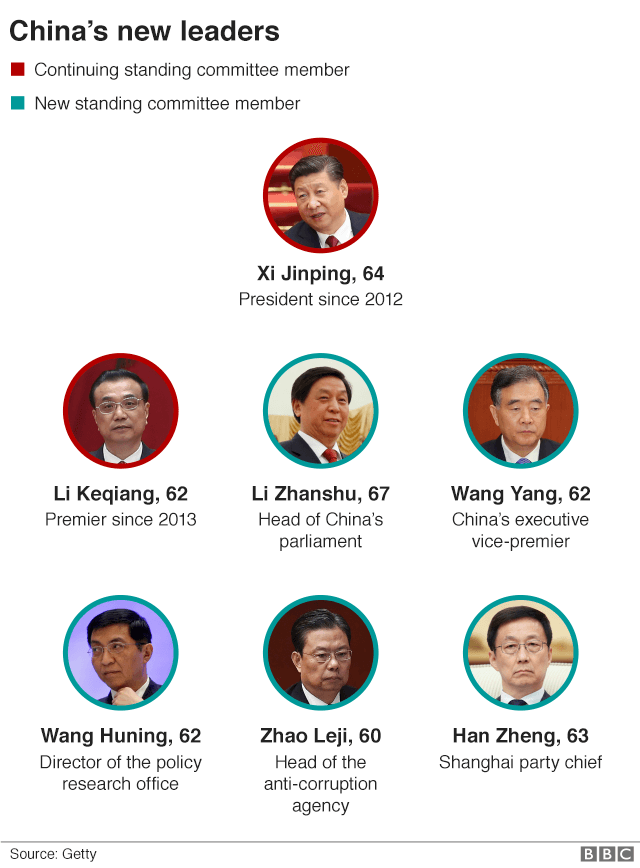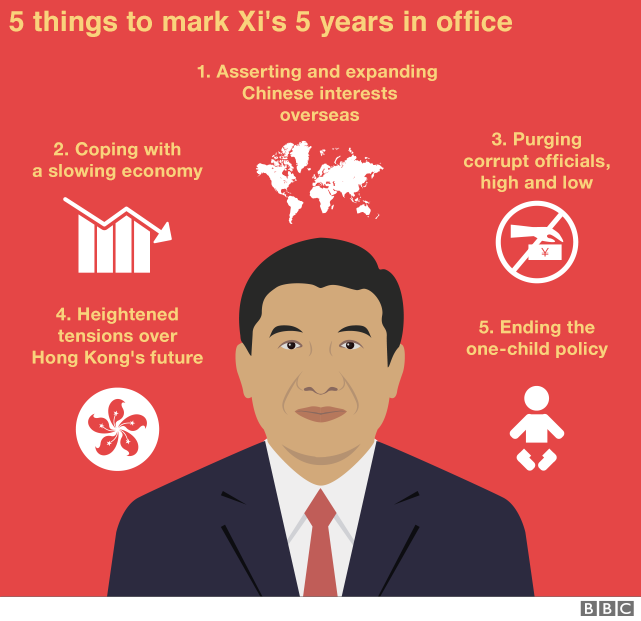 |
| The two presidents met in Hamburg this summer |
US President Donald Trump has congratulated Chinese leader Xi Jinping on his "extraordinary elevation" after this week's Communist Party congress.
Mr Trump also praised Mr Xi in a TV interview in the US, and said "some might call him king of China".
Mr Xi cemented his hold on China when he had a second five-year term confirmed, with no clear successor, at the congress.
His name and doctrine have been written into the party's constitution.
The two leaders are due to hold talks at a state visit to China next month, having met at the G20 summit in July.
The pair also discussed North Korea and trade, President Trump said in a tweet. Hours later North Korean leader Kim Jong-un also congratulated Mr Xi.
In the phone call with Mr Trump, Mr Xi expressed a desire to work with the US president to "jointly blueprint future development of China-US ties", Chinese state media report.
Separately, Mr Trump praised Mr Xi as a "very good person" with whom he had "a very good relationship", in an interview with Fox Business Network.
Describing Mr Xi's elevation as something that "really virtually never happened in China", Mr Trump called the Chinese leader "a powerful man".
"People say we have the best relationship of any president-president, because he's called president also. Some people might call him the king of China, but he's called president."
China has the world's second-largest economy after the US, its biggest trading partner.
However, relations have been strained by Beijing's territorial disputes in the South China Sea and East China Sea with Washington's allies in East Asia.
Xi Jinping 'most powerful Chinese leader since Mao Zedong'
China congress: No heir apparent as Xi reveals top leadership
Meanwhile North Korean state media agency KCNA reported that leader Kim Jong-un sent a congratulatory message to Mr Xi.
The message "expressed the conviction that the relations between the two parties and the two countries would develop in the interests" of the Chinese and North Koreans.
It also officially acknowledged Mr Xi's political doctrine, noting that China had "entered the road of building socialism with Chinese characteristics in the new era".
Though relations have cooled in recent years, amid Pyongyang's nuclear and missile tests, China remains North Korea's closest ally.
Beyond 2022?
On Wednesday, Mr Xi was formally handed a second term in office at the close of the Communist Party congress in Beijing.
He is now on a par with the founder of the state, Mao Zedong, and questions have been raised over whether the 64-year-old intends to rule beyond 2022.
Five new appointments were made to the seven-member Politburo Standing Committee, China's most powerful body.
There had been speculation Mr Xi would elevate his protégé Chen Miner and Guangdong party secretary Hu Chunhua, both of whom are in their 50s and young enough to be credible successors.
But the fact that the new appointees are all in their 60s, and likely to retire at the end of this five-year term, fuels speculation about Mr Xi's long-term intentions.
Russian President Vladimir Putin sent a telegram in which he said the re-election showed Mr Xi's "political authority" and the "broad support" his policy to develop China and strengthen its international position enjoyed.
South Korean President Moon Jae-in congratulated Mr Xi on his re-election in a letter, writing that he looked forward to creating a "practical strategic partnership".

Foreign press barred
Mr Xi has assumed an unprecedented number of positions since coming to power in 2012, including the title of "core" leader of China.
His first term has been marked by significant development, a push for modernisation and increasing assertiveness on the world stage.
It has also seen growing authoritarianism, censorship and a crackdown on human rights.
He has spearheaded a sweeping anti-corruption campaign which has seen more than a million officials disciplined. It has been seen by some as a massive internal purge of opponents.
Several major Western news organisations were barred from Wednesday's ceremony to reveal the new Politburo Standing Committee.
Officially no reason was given for barring the BBC, Financial Times, Economist, New York Times and Guardian, but unofficially journalists were told that their reporting was to blame - another sign of Xi's determination to control the message at home and abroad.

